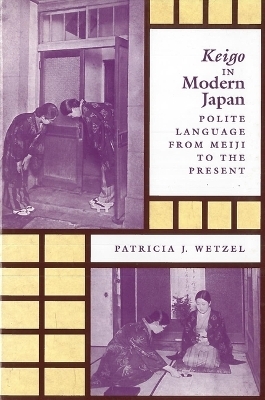
Keigo in Modern Japan
Polite Language from Meiji to the Present
Seiten
2004
University of Hawai'i Press (Verlag)
978-0-8248-2602-4 (ISBN)
University of Hawai'i Press (Verlag)
978-0-8248-2602-4 (ISBN)
Offering a comprehensive examination of a frequently discussed yet much misunderstood aspect of the Japanese language, this book looks at Keigo, or ""polite language"". It argues that modern keigo consciousness and keigo grammar merged out of Japan's encounter with Western trends.
Here is a comprehensive examination of a frequently discussed yet much misunderstood aspect of the Japanese language. Keigo, or ""polite language,"" is often viewed as a quaint accessory to Japanese grammar and a relic of Japan's feudal past. Nothing, Patricia Wetzel contends, could be further from the truth. It is true that Japan has a long history of differentiating linguistic form on the basis of social status, psychological detachment, emotional reserve, and a host of other context-dependent factors. But, as is made clear in this broadly framed study, modern keigo consciousness and keigo grammar emerged out of Japan's encounter with Western intellectual trends in the mid- to late nineteenth century. Keigo in Modern Japan presents a finely nuanced linguistic and political review of keigo available nowhere else in English. The first chapter outlines the ways in which keigo has been problematized in Western linguistics through the application of structuralist analysis and its off-shoots. But keigo's presence in the English-language literature does not begin to compare with the place it occupies in the Japanese linguistic canon. Wetzel describes the historical roots and growth of keigo and the popularity of how-to manuals, which, she contends, are less about overt instruction than reinforcing what people already believe.
Here is a comprehensive examination of a frequently discussed yet much misunderstood aspect of the Japanese language. Keigo, or ""polite language,"" is often viewed as a quaint accessory to Japanese grammar and a relic of Japan's feudal past. Nothing, Patricia Wetzel contends, could be further from the truth. It is true that Japan has a long history of differentiating linguistic form on the basis of social status, psychological detachment, emotional reserve, and a host of other context-dependent factors. But, as is made clear in this broadly framed study, modern keigo consciousness and keigo grammar emerged out of Japan's encounter with Western intellectual trends in the mid- to late nineteenth century. Keigo in Modern Japan presents a finely nuanced linguistic and political review of keigo available nowhere else in English. The first chapter outlines the ways in which keigo has been problematized in Western linguistics through the application of structuralist analysis and its off-shoots. But keigo's presence in the English-language literature does not begin to compare with the place it occupies in the Japanese linguistic canon. Wetzel describes the historical roots and growth of keigo and the popularity of how-to manuals, which, she contends, are less about overt instruction than reinforcing what people already believe.
| Erscheint lt. Verlag | 31.1.2004 |
|---|---|
| Zusatzinfo | 16 illustrations |
| Verlagsort | Honolulu, HI |
| Sprache | englisch |
| Gewicht | 490 g |
| Themenwelt | Geisteswissenschaften ► Philosophie ► Sprachphilosophie |
| Geisteswissenschaften ► Sprach- / Literaturwissenschaft ► Sprachwissenschaft | |
| ISBN-10 | 0-8248-2602-7 / 0824826027 |
| ISBN-13 | 978-0-8248-2602-4 / 9780824826024 |
| Zustand | Neuware |
| Haben Sie eine Frage zum Produkt? |
Mehr entdecken
aus dem Bereich
aus dem Bereich
Macht und Legitimität politischer Sprache im Prozess der europäischen …
Buch | Softcover (2023)
Nomos (Verlag)
74,00 €
KI, Kreativität und algorithmische Postrationalität
Buch | Softcover (2024)
Matthes & Seitz Berlin (Verlag)
16,00 €
Wie die Menschheit zu ihrer größten Erfindung kam
Buch | Softcover (2022)
C.H.Beck (Verlag)
18,00 €


